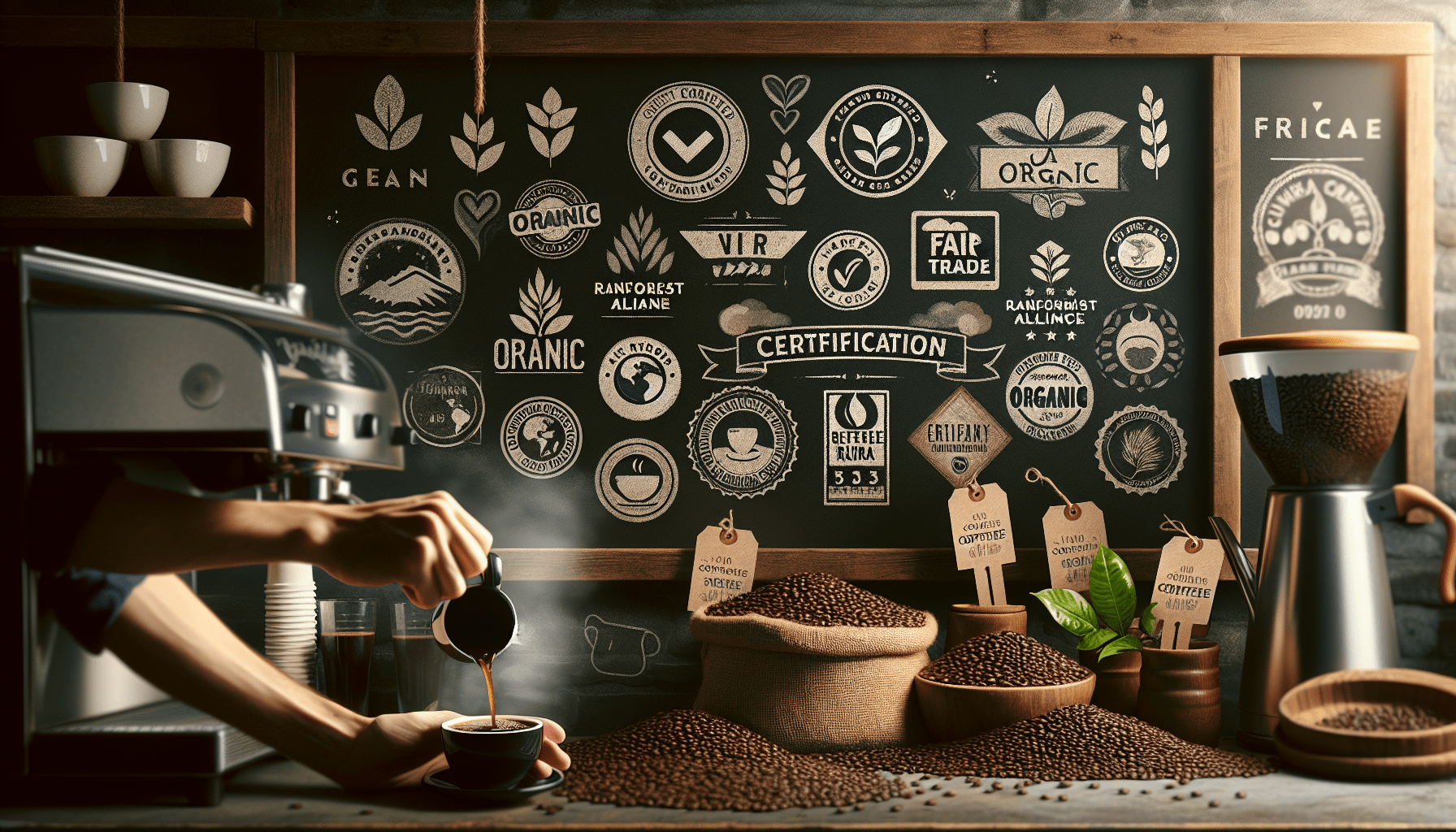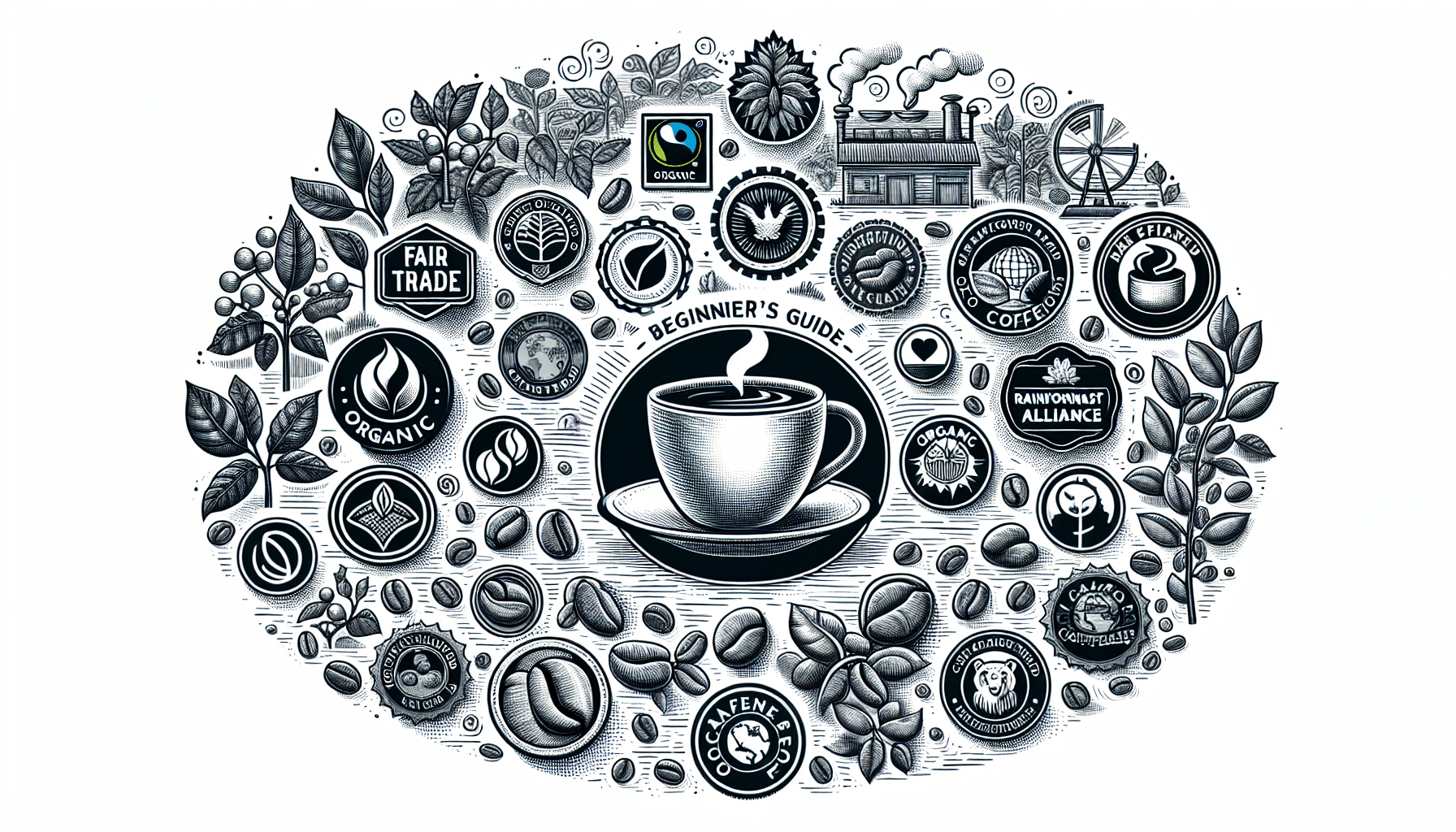Coffee certifications and labels can be confusing, especially for beginners trying to explore the world of specialty coffee. From Fair Trade to Organic, Shade Grown to Direct Trade, there seems to be an endless array of terms and logos to decipher. In this guide, we will unravel the mysteries behind coffee certifications and labels, giving you a clearer understanding of what they mean and how they can help you make informed choices when purchasing your next cup of joe. Whether you’re looking for ethically sourced beans, sustainable farming practices, or simply a delicious brew, this article will serve as your compass in navigating the intricate world of coffee certifications and labels.
Understanding Coffee Certifications
What are coffee certifications?
Coffee certifications are official labels or seals that are given to coffee products that meet specific standards and requirements set by certifying organizations. These certifications provide consumers with information about the social, environmental, and economic practices involved in coffee production.
Why are certifications important?
Coffee certifications are important because they enable consumers to make informed choices about the coffee they purchase. By looking for specific certifications, consumers can support coffee farmers and producers who adhere to responsible and sustainable practices. Certifications also help ensure that workers in the coffee industry are treated fairly and that environmental standards are upheld.
Different types of coffee certifications
There are several types of coffee certifications available, each focusing on different aspects of coffee production. Some common certifications include Fair Trade, Organic, Rainforest Alliance, Bird-Friendly, Direct Trade, Shade-Grown, and Utz.
Organizations that provide coffee certifications
Various organizations provide coffee certifications and set the standards for coffee production. Some well-known certifying organizations include Fairtrade International, Organic Certifiers, Rainforest Alliance, Smithsonian Migratory Bird Center, Direct Trade, Coffee Kids, Utz Certified, and others.
Fair Trade Certification
What is Fair Trade certification?
Fair Trade certification ensures that coffee farmers and workers receive fair wages and better trading conditions. Fair Trade standards protect small-scale farmers from exploitation and guarantee a minimum price for their coffee, ensuring a stable income. This certification also promotes sustainable farming practices and community development.
Benefits of Fair Trade coffee
Fair Trade coffee empowers farmers by providing them with fair compensation for their hard work and efforts. By purchasing Fair Trade coffee, consumers can support sustainable and ethical practices, contribute to community development projects, and promote environmental stewardship.
Criticism and controversies
Fair Trade certification has faced criticism for a variety of reasons. Some argue that the Fair Trade premium is not always effectively invested in community development projects, while others believe it creates market distortions and limits competition.
Fair Trade labels to look for
When purchasing coffee, look for labels such as Fair Trade Certified or the Fair For Life certification, which guarantee that the coffee meets Fair Trade standards and supports fair and sustainable practices.

Organic Certification
What is Organic certification?
Organic certification ensures that coffee is produced without the use of synthetic pesticides, herbicides, or genetically modified organisms (GMOs). Organic coffee farms rely on natural and sustainable farming practices, which is not only better for the environment but also promotes healthier living conditions for farmers and their communities.
Benefits of Organic coffee
Choosing Organic coffee means supporting environmentally-friendly practices and reducing the exposure to harmful chemicals in the coffee you drink. Organic farming also promotes biodiversity, soil health, and water conservation.
Challenges and limitations
Organic certification can be a complex and expensive process for coffee farmers, especially smaller-scale producers. Additionally, meeting organic standards may be challenging in regions where pests and diseases are prevalent.
Organic labels to look for
Look for labels such as USDA Organic, EU Organic, or the Organic Certifiers logo when purchasing coffee. These labels indicate that the coffee has been certified organic and meets rigorous organic farming standards.
Rainforest Alliance Certification
What is Rainforest Alliance certification?
Rainforest Alliance certification focuses on sustainable farming practices, biodiversity conservation, and the fair treatment of workers. This certification ensures that coffee is produced in ways that protect ecosystems, wildlife, and the rights and well-being of coffee farmers and workers.
Benefits of Rainforest Alliance coffee
Rainforest Alliance coffee encourages environmentally responsible practices, such as agroforestry and natural resource conservation. This certification also promotes social and economic benefits for coffee communities, including fair wages, access to education, and healthcare.
Criticism and limitations
Rainforest Alliance certification has faced some criticism for not being as strict as other certifications. Some argue that it does not focus enough on social issues and workers’ rights. However, the Rainforest Alliance has made efforts to address these concerns and continuously improve its standards.
Rainforest Alliance labels to look for
Look for the Rainforest Alliance Certified seal on coffee packaging, which indicates that the coffee meets the organization’s rigorous sustainability and social standards.

Bird-Friendly Certification
What is Bird-Friendly certification?
Bird-Friendly certification focuses on protecting bird habitats and promoting environmentally friendly practices that benefit migratory birds. Coffee farms with this certification meet specific criteria that help maintain forest cover, biodiversity, and ecological balance.
Benefits of Bird-Friendly coffee
By choosing Bird-Friendly coffee, consumers contribute to the conservation of bird habitats and the preservation of biodiversity. Coffee farms with this certification also adhere to organic farming practices, promoting environmental sustainability.
Criticism and challenges
One criticism of Bird-Friendly certification is that it may not prioritize addressing social and economic challenges faced by coffee farmers. Additionally, the certification process can be rigorous and costly, making it difficult for smaller-scale farmers to participate.
Bird-Friendly labels to look for
Look for coffee with the Smithsonian Bird-Friendly logo, which guarantees that the coffee meets strict standards for bird habitat preservation and promotes sustainable agriculture.
Direct Trade Certification
What is Direct Trade certification?
Direct Trade certification focuses on building direct relationships between coffee producers and buyers, bypassing traditional trade channels. This certification aims to ensure fair prices for farmers and promotes transparent and sustainable relationships throughout the supply chain.
Benefits of Direct Trade coffee
Direct Trade certification fosters mutually beneficial relationships between coffee farmers and buyers. It allows farmers to receive higher prices for their coffee, supports community development projects, and promotes transparency and traceability in the supply chain.
Challenges and limitations
Direct Trade certification may be challenging for smaller coffee producers due to limited resources and access to markets. Additionally, the lack of standardized criteria across Direct Trade certifications can make it difficult for consumers to compare and make informed decisions.
Direct Trade labels to look for
Direct Trade coffee may not have a specific certification label. Instead, look for companies that openly communicate their direct relationships with coffee producers and emphasize transparency and fair pricing.

Shade-Grown Certification
What is Shade-Grown certification?
Shade-Grown certification ensures that coffee is grown under a canopy of trees, preserving natural habitats, promoting biodiversity, and maintaining soil health. This certification supports sustainable farming practices that have a minimal impact on the environment.
Benefits of Shade-Grown coffee
By choosing Shade-Grown coffee, consumers support the preservation of forests, provide habitats for wildlife, and help maintain soil fertility. Shade-Grown coffee farms also have a lower need for synthetic inputs, reducing the use of chemicals.
Criticism and concerns
Some critics argue that Shade-Grown certification does not adequately address social and economic issues in coffee-producing communities. Additionally, meeting the certification requirements can be challenging for farmers, depending on the region and climate conditions.
Shade-Grown labels to look for
Look for labels such as “Certified Shade-Grown” or “Bird-Friendly Shade-Grown” to indicate that the coffee has been certified under specific shade-grown standards.
Utz Certification
What is Utz certification?
Utz certification focuses on responsible and sustainable coffee production. It covers social, environmental, and economic aspects of coffee farming, ensuring that coffee is produced in a way that benefits farmers, workers, and the environment.
Benefits of Utz coffee
Utz coffee promotes responsible farming practices, including good agricultural practices, fair working conditions, and sustainable use of resources. This certification also contributes to long-term profitability and the well-being of coffee-producing communities.
Challenges and limitations
Utz certification faces challenges related to verifying compliance and enforcing standards across a large number of coffee producers. Some critics also argue that the certification does not go far enough in setting strict environmental standards.
Utz labels to look for
Look for the Utz Certified label, which guarantees that the coffee has been produced according to Utz standards for responsible and sustainable farming practices.

Certified Organic vs. Fair Trade
Differences between Organic and Fair Trade certifications
While both Organic and Fair Trade certifications promote sustainability and ethical practices in the coffee industry, there are some key differences. Organic certification focuses on farming practices and prohibits the use of synthetic chemicals, while Fair Trade certification emphasizes fair wages and better trading conditions for farmers.
Which one should you prioritize?
Choosing between Organic and Fair Trade certifications depends on your personal priorities. If you are concerned about environmental impact and chemical use, prioritize Organic certification. If you want to support fair wages and better livelihoods for farmers, prioritize Fair Trade certification. Some coffee brands may have both certifications, offering a balanced choice.
Understanding Coffee Labels
Importance of reading coffee labels
Reading coffee labels is crucial for understanding the quality, production methods, and certifications of the coffee you are purchasing. Labels provide valuable information about the origin, roast level, flavor notes, and certifications, helping you make an informed decision.
Common terms found on coffee labels
Coffee labels can include terms such as “single origin,” which indicates that the coffee comes from a specific geographic region, or “direct trade,” indicating a direct relationship between the coffee producer and the buyer. Other terms can include roast levels, flavor descriptors, and brewing recommendations.
Decoding coffee labels for certification information
To find certification information on coffee labels, look for specific certification logos or names mentioned on the packaging. Certifications such as Fairtrade, Organic, Rainforest Alliance, and others will be clearly displayed if the coffee meets those standards. Additionally, some coffee brands may provide additional information on their websites or packaging to explain their sustainability and ethical practices.
Navigating the world of coffee certifications and labels can seem overwhelming, but understanding their significance and checking for specific certifications can help ensure that the coffee you choose aligns with your values. Next time you’re shopping for coffee, take a closer look at the labels and make an informed decision that supports responsible and sustainable coffee production.

